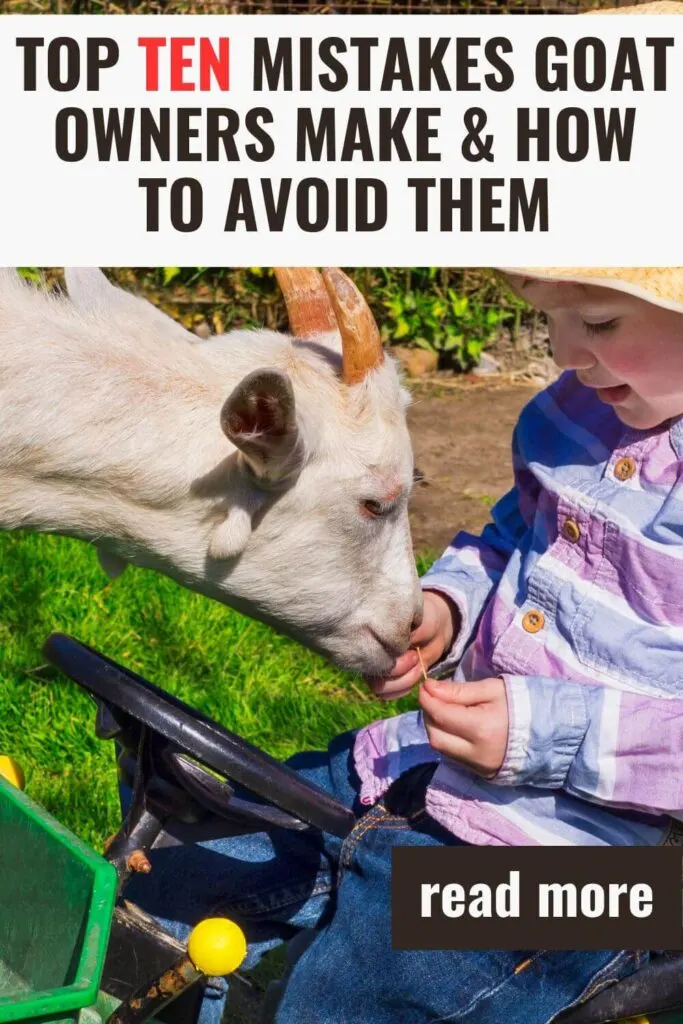Top Ten Mistakes Goat Owners Make and How to Avoid Them
Owning goats can be a delightful and rewarding experience, but like any livestock venture, it comes with its unique challenges. From nutritional oversights to management mishaps, goat owners may inadvertently make mistakes that impact the health and well-being of their herds. In this article, we’ll explore the top ten mistakes often made by goat owners and provide insights on how to avoid them.
Neglecting Proper Nutrition:
One of the most common mistakes is overlooking the nutritional needs of goats. Goats require a well-balanced diet with access to high-quality forage, minerals, and, if necessary, supplemental grains. Neglecting proper nutrition can lead to health issues, reduced productivity, and increased susceptibility to diseases.
You can’t treat goats like other livestock. And you can’t feed them like cows or sheep or horses. They require a much different nutrition profile and without it, they will get sick and die.
Avoidance: Work with a veterinarian or experienced goat nutritionist to develop a feeding plan tailored to your goats’ specific needs. Regularly assess their body condition and adjust the diet accordingly.
Inadequate Shelter and Fencing:
Goats are skilled escape artists and can be hard on fencing. Inadequate shelter and fencing can lead to goats roaming where they shouldn’t, posing risks to their safety and causing headaches for owners.
Avoidance: Invest in sturdy fencing, and regularly inspect and repair any damage. Provide adequate shelter to protect goats from harsh weather conditions, ensuring they have a safe and comfortable environment.
Overlooking Parasite Management:
Parasites are a common concern for goats, and overlooking proper management can lead to serious health issues. Some owners may rely too heavily on dewormers, contributing to drug resistance.
Avoidance: Implement a strategic parasite management program that includes regular fecal testing, pasture rotation, and targeted deworming based on need. Consult with a veterinarian to develop a sustainable plan.
Ignoring Regular Health Checks:
Failure to conduct regular health checks may result in delayed detection of potential issues. Goats are masters at hiding signs of illness, and early intervention is crucial for effective treatment.
Avoidance: Schedule regular health checks and observe your goats for changes in behavior, appetite, or physical condition. Swiftly address any signs of illness or discomfort.
Breeding Improperly and Overbreeding:
Breeding does too young and breeding bucks that are much larger than the does can cause problems. And breeding does too soon after kidding will put undue stress on their already over taxed bodies.
Breeding goats excessively without proper consideration of genetics, health, and resources can lead to overpopulation and increased management challenges.
Avoidance: Allow your does the time to grow and mature. Although in nature, they can breed their first year, consider waiting until their second year to breed them. Find the appropriate size of buck for the size of your does to eliminate the problem of a doe growing kids to large for her frame and creating problems during delivery. And breed your does once per year
Plan and manage your breeding program responsibly. Consider the resources available, the health of the breeding stock, and the overall goals of your herd.
Neglecting Social Dynamics:
Goats are social animals, and disruptions in their social structure can lead to stress and behavioral issues. Introducing new goats abruptly or separating bonded companions can cause anxiety.
Avoidance: Gradually introduce new goats and monitor social interactions. Avoid unnecessary separation of bonded animals, and provide a stable social environment.
Relying Solely on Internet Advice:
While the internet is a valuable resource, relying solely on online advice can lead to misinformation and misguided practices. Each goat is unique, and there is no one-size-fits-all solution.
Avoidance: Seek advice from reliable sources, including experienced goat owners, local extension offices, and veterinarians. Join goat clubs or online forums for community support.
Livestock Guardian Dogs:
There are many threats and predators of a goat. If you live in an area with a high risk of loose dogs in the neighborhood, bears, coyotes, wolves, panthers or mountain lions, then a LGD would be a wise option.
Avoidance: Find the guardian dog breed that fits your situation the best and utilize their advantageous ability to protect your entire farm from intruders.
Failure to Plan for Emergency Situations:
Being unprepared for emergencies, such as illness, injury, or extreme weather events, can result in delayed responses and increased stress for both goats and owners.
Avoidance: Have a well-stocked first aid kit, establish a relationship with a veterinarian, and develop an emergency plan. Regularly assess the safety and security of your goat facilities.
Not Investing in Education:
Lack of knowledge about goat behavior, nutrition, and health can contribute to a host of issues. Some owners may not invest enough time in educating themselves about the specific needs of goats.
Avoidance: Continuously educate yourself through books, workshops, and mentorship from experienced goat owners. Stay informed about the latest advancements in goat husbandry and healthcare.
Conclusion:
Owning goats is a journey filled with joy and challenges. By avoiding common mistakes and staying informed, goat owners can create a thriving and healthy herd. Regular veterinary care, proper nutrition, attentive management, and a commitment to ongoing education are the keys to successful goat ownership. As you embark on this adventure, remember that every mistake is an opportunity to learn and improve your practices for the benefit of both you and your goats.
This will be a great next stop for you. This page will give you valuable insight into raising goats: Raising Goats Resource Page
